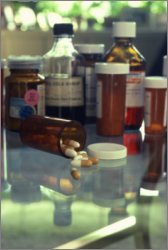Teen Drug Use:
Good News and Bad News Revealed in New Report
by www.SixWise.com
Illegal drug use among the nation's 8th, 10th and 12th graders
is on a steady decline, according to results of the 33rd national
survey in the Monitoring the Future series conducted by scientists
at the University of Michigan's Institute for Social Research.
|

One in five teens has abused a prescription pain medication.
If you keep prescription drugs of any kind in your home,
make sure they're in a place where teens can't get to
them, or at the very least check them regularly to make
sure none are missing.
|
Only 13 percent of 8th graders reported using an illicit
drug at least once in the 12 months prior to the survey, compared
with 24 percent in 1996. Meanwhile, 28 percent of 10th graders
and 36 percent of 12th graders had used drugs, compared to
39 percent and 42 percent, respectively, in 1997.
However, while use of marijuana,
Ritalin and crystal
meth declined, certain drugs are holding steady.
Use of cocaine, crack cocaine, LSD, hallucinogens other than
LSD, heroin, and most of the prescription-type psychoactive
drugs (including sedatives, tranquilizers, and narcotics such
as OxyContin and Vicodin) did not decline.
In fact, among high school seniors at least one in 20 have
tried OxyContin in the past year, and the percentage of students
using Vicodin was 2.7 percent, 7.2 percent and 9.6 percent
in 8th, 10th and 12th grades, respectively.
Further, use of ecstasy
actually increased this year among 10th graders and 12th graders.
The increase, researchers said, may be due to "generational
forgetting," in which new groups of adolescents are replacing
the previous generation who knew more about the drug's hazards.
As for over-the-counter cough and cold medications that contain
the active
ingredient dextromethorphan, 4 percent of 8th graders,
5 percent of 10th graders and 6 percent of 12th graders have
used them in the past year (the same percentages that used
them in 2006).
Prescription Drug Use a Growing Problem
Many teenagers view prescription drugs as somehow safer than
illegal ones. They're prescribed by a doctor, after all, so
they must be safe. However, the number of kids using prescription
drugs to get high or for "self-medicating" purposes
is alarming. According to the 2007 Partnership for a Drug-Free
America's annual tracking study:
-
1 in 5 teens has abused a prescription pain medication
-
1 in 5 report abusing prescription stimulants and tranquilizers
-
1 in 10 has abused cough medication
How can you tell if your teen may be abusing drugs, prescription
or otherwise? Watch for these signs from Parents. The Anti-Drug:
|

When talking to your teen about drug use, stay calm
and remind them that you LOVE them and want to help.
|
-
Changes in friends
-
Negative changes in schoolwork, missing school, or declining
grades
-
Increased secrecy about possessions or activities
-
Use of incense, room deodorant, or perfume to hide smoke
or chemical odors
-
Subtle changes in conversations with friends, e.g. more
secretive, using "coded" language
-
Change in clothing choices: new fascination with clothes
that highlight drug use
-
Increase in borrowing money
-
Evidence of drug paraphernalia such as pipes, rolling
papers, etc.
-
Evidence of use of inhalant products (such as hairspray,
nail polish, correction fluid, common household products);
Rags and paper bags are sometimes used as accessories
-
Bottles of eye drops, which may be used to mask bloodshot
eyes or dilated pupils
-
New use of mouthwash or breath mints to cover up the
smell of alcohol
-
Missing prescription drugs -- especially narcotics and
mood stabilizers
If you suspect that your teen is using drugs, it's important
to act on your suspicion right away. Teens are naturally private
about their lives at this age, but you can still confront
them about your concerns by:
-
Telling your teen exactly what you're concerned about
(did you find drug paraphernalia? Notice a change in their
appearance or attitude?)
-
Remaining calm. Avoid accusing your teen, and instead
try to understand why your teen is using drugs (ask, "Did
you try drugs to fit in with your friends? Or because
you are bored or sad?")
-
Letting your teen know that you love him or her.
-
Listening to their responses to your questions.
-
Sharing some of the health consequences of drug use.
Next, you can take steps to curb the drug use by:
-
Asking questions about your teen's life: Where are they
going? Who are they hanging out with? What will they be
doing?
-
Setting new rules, such as curfews, less time hanging
out with friends, less computer use or less cell phone
use
-
Encouraging them to join social activities such as sports
or other after-school organizations that will help them
to meet new people and keep busy.
-
Praising positive behaviors that you notice.
If you need further assistance, the U.S. Department of Health
and Human Service's Substance Abuse & Mental Health Services
Administration has a substance
abuse treatment facility locator that allows you to find
help in your area.
Recommended Reading
Study
Drugs -- Use of These Dangerous New Drugs is Skyrocketing Among
the A+ Student Crowd
Illegal
Drugs Identification Chart: What They Look Like & How
to Recognize Their Effects
Sources
University
of Michigan News Service December 11, 2007
The
Partnership for a Drug-Free America
Parents.
The Anti-Drug